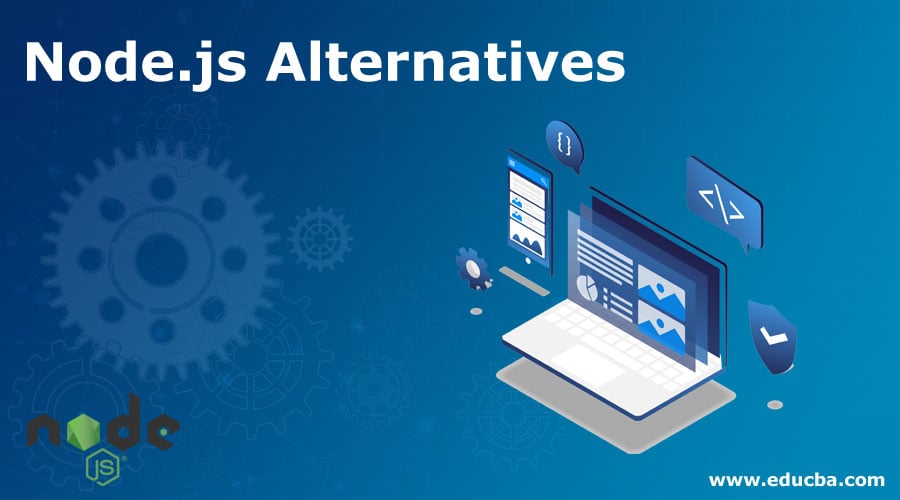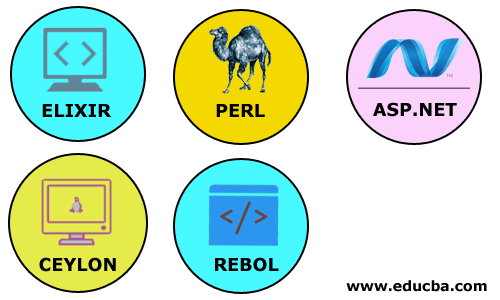
Introduction to Node.js Alternatives
The node, as we all know, is a significant development environment. Its compatibility with JavaScript creates more room and demand in the market and user segment. In this article, we will see some top alternatives to Node.js. Node.js is a runtime environment, which means software that allows application creation in the Javascript executable for the given OS. Node.js uses the Chrome V8 Javascript engine written in C++ to do this. Node was a creation by Ryan Dalp in 2009; at present, it has a stable version of v0.10.36 (which is also the latest edition). The node’s event-driven and non-blocking I/O features make it lightweight, efficient, and compatible with different devices.
- Open source
- Cross-platform
- Run time environment
- Used to create server-side and Networking applications
- OS – Windows, Linux, and X
- License – MIT license
Who uses Node.js: A long list of companies is there, eBay, general electric, GoDaddy, Microsoft, PayPal, Uber, Yammer, and Yahoo.
Where to use Node.js: For I/O-specific applications, data streaming applications, DIRT, JSON API’s based, and Single page applications
List of Node.js Alternatives
There are several other fine Node.js Alternatives available in the market, which are as follows
1. ELIXIR
Imagine you have a product that works great over browsers, but now you want to go over mobiles. In doing so, you will choose Rest API (in this case, choosing ERLANG will not make any sense). Using Java or Node.js, you can implement scalable solutions quickly.
When do we need ERLANG?
So, you already have a mobile application; now you want to implement messaging services or make it more severe; you want to make a messaging service in real time. This real-time means fast data processing. In this case, ERLANG is very hard to beat. Erlang has a shorter code structure making the scaling system easier with fast execution. With Erlang debugging of the production, the suite is easy.
What is ERLANG, and how is ELIXIR related to it?
Elixir is a dynamic and functional language used to build scalable applications, and in this Erlang (the Virtual Machine of Elixir) helps it.
- Elixir is an Open Source
- Compatible with Mac, Windows, Linux
Features of Elixir:
- Scalability: The code user in Elixir are both vertical and horizontally scalable, which means it allows thousands of processes to run at the same time (i.e., vertical scaling) and even on different machines within the same network (i.e., horizontal scaling). This behavior helps in several ways, with efficient resource management to a solid foundation.
- Functional Programming: Always an edge for Elixir as it enables its users with short, fast, and easy maintenance coding.
2. PERL
It’s a high-level, general-purIt’s programming language. It has a great development toolset with an ever-increasing user base. Perl has a connection to other programming languages as it has multiple work segments. It resembles C, Shell scripting, AWK, and SED. With these similar features, Perl provides its user with a powerful text processing facility.
Features of Perl:
- Easily expandable with more than 25,000 open source modules available globally and via CPAN.
- Text Manipulation makes working with HTML, XML, and several other mark-up languages relevant.
- Open source – an open source with a GPL license
- It has a C/C++ interface and database integration.
Several applications are built in the market using Perl: Matrix, Gitweb, AWStats, and Cucumber.
- Perl is an Open source
- Compatible with Mac, Windows, Linux OS
3. ASP.NET
Either it is web-based applications, complex APIs, real-time development, or even Microservices. ASP.NET is one such complete package. This makes it a top qualifying contender and an alternative to Node.js.
- It’s an Open source
- Server Side web applications framework
Features of ASIt’sT:
- Websites using HTML, CSS, and JavaScript are great and most compatible while working with ASP.NET.
- API for creating RESTful web services that use JSON and XML to support the contents.
- An excellent tool for value providers with the use of filters. These filters are Cookies, Control value, Session details, and Querystring.
4. CEYLON
It’s a general-purpose PL with a syntax similar to C# and Java. A Few key highlights defining Ceylon are its imperative, statically typed, blocked structure and object-oriented behavior.
Features of CEYLON:
- Statistically typed means a complete and extensive type of checking by its compiler; this happens with the annotations structure built into the code.
- High order means every attribute, operation, and every single type used is a value.
- With block, structure means it has lexical scoping and recursive syntax for deceleration and statements.
- Ceylon is also open source
- Compatible with Mac, Windows, Linux, JavaScript, and Hotspot JVM
5. REBOL
Rebol is a cross-platform language developed for effective data exchange with the multi-paradigm approach. With Network communication being the prime purpose behind its functionality, it is also suitable for small, optimized domains – the specific language for coding data.
Features of REBOL:
- File sharing, Synchronization, and archival – Easy to share files to keep users synchronized, and files are automatically achieved to call the earlier version of coding if needed instantly.
- Highly secure platform – Powerful language capabilities provide a secure platform for creation, data exchange, storage retrieval, and client/server administrative tasks.
- Offline access
- Private group networking capabilities make Rebol free from junk work emails.
- Easy to install and use
- It’s a free source
- Compatible with Mac, Windows, and Linux
Conclusion
Hope this brings some clarity to our readers regarding the Alternative option of Node.js available and an understanding of when to choose a particular one over others. We are aware that several functionalities are built in any specific language. Still, we in this article covered the Alternatives of Node.js with compatibility with Operating Systems (OS, Windows, and Linux in most cases).
Recommended Articles
This has been a guide on Node.js Alternatives. Here we have discuss the Basic concept of Node.js and alternatives with their essential Features. You may also look at the following article to learn more:

